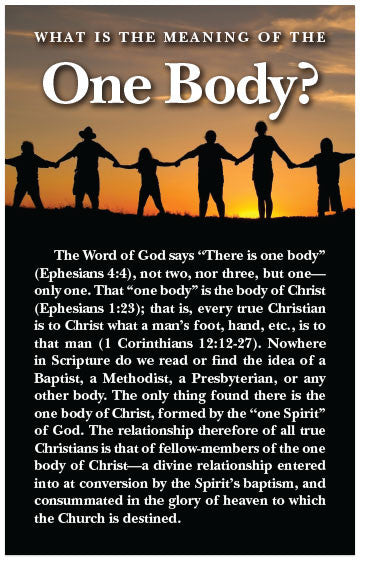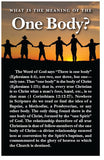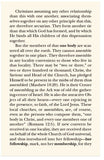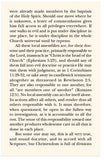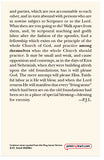What is the Meaning of the One Body? (KJV)
Special-Order Folded Tract
 NOTE: This item is custom-printed to order (click for more details).
NOTE: This item is custom-printed to order (click for more details).
This tract is from our print-on-demand library, and is not kept in stock. Select the options below, and we will custom-print a batch just for you. Because this item is custom-printed, you can add your custom imprint to the back page at no extra cost.
- Estimated shipping date: Thursday, March 12 (Click for more details)
- SKU:
- Discounts: Discount coupons do not apply to this item
- Format: Folded Tract
- Size: 3.5 inches x 5.5 inches
- Pages: 4
- Imprinting: Available with 5 lines of custom text
- Version: KJV
- Returns: Because this item is custom-printed to order, it cannot be returned.
Show all item details
The full text of this tract is shown below in the KJV version. (Do you want to print this tract in a different version than the one listed? Contact us and let us know what you're looking for—we may be able to create the alternate version for you at no charge.)
The Word of God says “There is one body” (Ephesians 4:4), not two, nor three, but one—only one. That “one body” is the body of Christ (Ephesians 1:23); that is, every true Christian is to Christ what a man’s foot, hand, etc., is to that man (1 Corinthians 12:12-27). Nowhere in Scripture do we read or find the idea of a Baptist, a Methodist, a Presbyterian, or any other body. The only thing found there is the one body of Christ, formed by the “one Spirit” of God. The relationship therefore of all true Christians is that of fellow-members of the one body of Christ—a divine relationship entered into at conversion by the Spirit’s baptism, and consummated in the glory of heaven to which the Church is destined.
Christians assuming any other relationship than this with one another, associating themselves together on any other principle that this, are therefore sectarian. They form another tie than that which God has formed, and by which He binds all His children of this dispensation together.
But the members of that one body are scattered all over the earth. They cannot assemble together in one place. They therefore assemble in any locality convenient to those who live in that locality. There may be “two or three,” or two or three hundred or thousand; Christ, the Saviour and Head of the Church, has pledged Himself to be present in the midst of them thus assembled (Matthew 18:20). He is their Center of assembling as the Ark was of old the gathering-center of Israel. He is also the attractive Object of all their hearts—every one rejoicing in the presence, to faith, of the Lord Jesus. These local churches, or assemblies, are, of course, even as the persons who compose them, “one body in Christ, and every one members one of another” (Romans 12:5). If new converts be received in one locality, they are received there on behalf of the whole Church of God universal, and thus introduced into her fellowship—her fellowship, mark, not her membership, for they were already made members by the baptism of the Holy Spirit. Should one move where he is unknown, a letter of commendation gives him full access to all privileges everywhere. If one walks in evil and is put under discipline in one place, he is under discipline in the whole Church universal until he repents.
All these local assemblies are, for their doctrine and their practice, primarily responsible to the Lord, inasmuch as “Christ is the head of the Church” (Ephesians 5:23), and should any of them fall into evil doctrine or practice He may visit them with judgment, as in 1 Corinthians 11:26-32, or take away its candlestick testimony altogether as threatened in Revelation 2:5. They are also responsible to one another, for all “are members one of another” (Romans 12:5). No local assembly can act for itself alone. Its actions affect all others, and render thus all others responsible with it. It must therefore, when questioned, be open in the fullest way to investigation, as it is accountable to all the rest. The sense of this responsibility toward one another produces wholesome care in all that is done in each place.
But some one may say, this is all very true, and sound doctrine, and in accord with all Scripture, but Christendom is full of divisions and parties, which are not accountable to each other, and in turn abound with persons who are in nowise subject to Scripture or to the Lord. What then are you going to do? Walk apart from them, and, by scriptural teaching and godly labor after the fashion of the apostles, find a fellowship which exists on the principle of the whole Church of God, and practice among themselves what the whole Church should practice. It may be small and weak, and cause opposition and contempt, as in the days of Ezra and Nehemiah, when they were building afresh upon the old foundations; but it will please God. The mere attempt will please Him. Faithful labor at it He will bless; and when the Lord returns He will manifest that every “living stone” which had been set on the old foundations had been set in a place of special blessing—blessing for eternity. —P.J.L.

